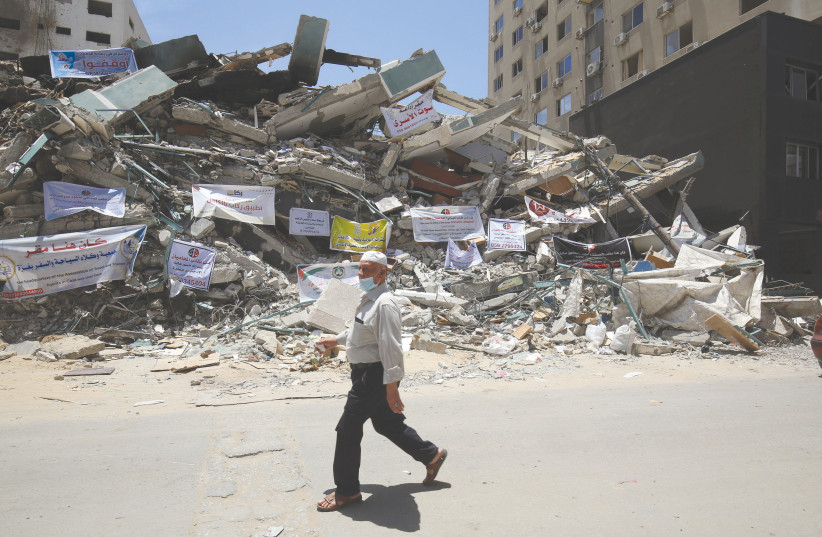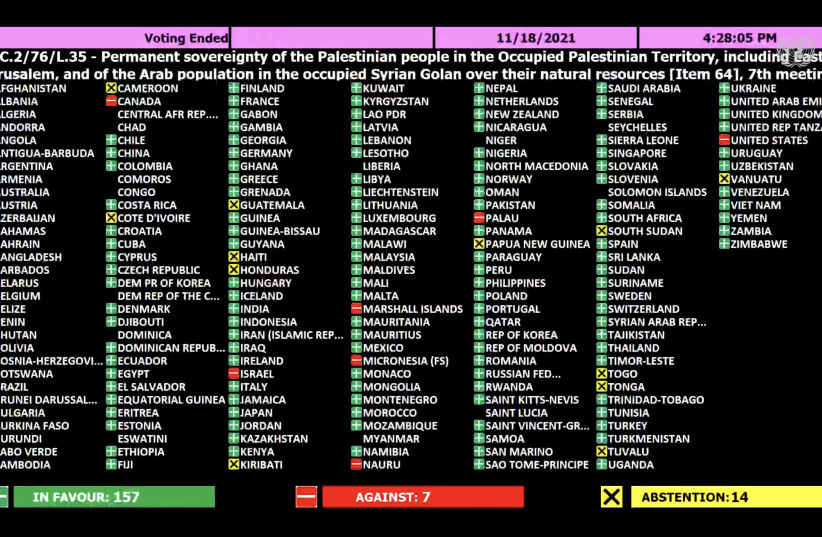The United Nations Second Committee approved 157-7 a draft resolution that called on Israel to halt its exploitation of Palestinian natural resources in Gaza, the West Bank and east Jerusalem.
It issued a similar call for Israel to cease such activity on the Golan Heights.
This included recognition of the rights of Palestinians and Syrians to claim restitution for the loss of such resources.
The resolution is part of a package of some 16 texts that will be approved this year by the UN General Assembly. Ten of those resolutions, including this one, first received preliminary approvals in their relative committees, before their final passage by the GA.
The seven countries that opposed the resolution on Thursday were Canada, Israel, Marshall Islands, Micronesia, Nauru, Palau and the United States. All of the European Union countries supported the text. Another 14 countries abstained, including Australia.

“The US remains disappointed that this body has again taken up this unbalanced resolution that is unfairly critical of Israel, demonstrating a clear and persistent institutional bias directed at one member state,” a US representative said.
“One-sided resolutions like those introduced here today only distract from the effort to advance peace.” ,” a US representative said. “This effort will be strengthened when the bias against Israel ends. The US will continue to oppose every effort to delegitimize Israel.”
The Palestinian representative, however, said that the resolution’s adoption sends a “clear message to the Palestinian people that the international community stood by them.

“It renews the call to Israel, the occupying power, to halt all the violation of international law and to cease its heinous exploitation and encroachment of our land and water – and to stop destroying our agriculture land and harming our environment, including the dumping of all kind of waste material in the occupied Palestinian territory,” he said.
The international community must demand “an end to the Israeli occupation of the Palestinian land,” the Palestinian representative said. “Accountability is important and imperative to achieve this call.”
An Israeli representative said that the resolution was “devoted to the cause of bashing Israel” and “wasted the limited resources of this committee.”
The international community is battling global hunger and the COVID-19 pandemic and within that background it should not be wasting its resources on texts such as this, he said.
“We should not continue to bring up the same outdated resolution over and over again,” the Israeli representative said. “Supporting this politically motivated resolution does not help us to move forward.”
“This draft resolution crystalizes a past littered by mistakes and a present devoid of courage while it utterly fails to offer a vision for the future,” he added.
“What the Palestinian delegation and this resolution will not tell you is all the ways in which Israel supports the Palestinian people,” particularly in the spheres of water and clean energy, the Israeli representative said.
“Not all attempts at cooperation have been successful, especially high profile attempts,” he said. “Because of political pressure, the Palestinian leadership refused Israel’s offer of at least one million doses of COVID-19 vaccines. The doses were instead accepted by another member state to save the lives of many of its citizens.”
The Palestinian representative attacked Israel for bringing up the issue of the rejected COVID-19 vaccinations.
The vaccine doses were “expired,” he said. “They could not be used.”
He emphasized that the Israeli official who addressed the second committee was not a “representative of Israel but the representative of the occupier.”
